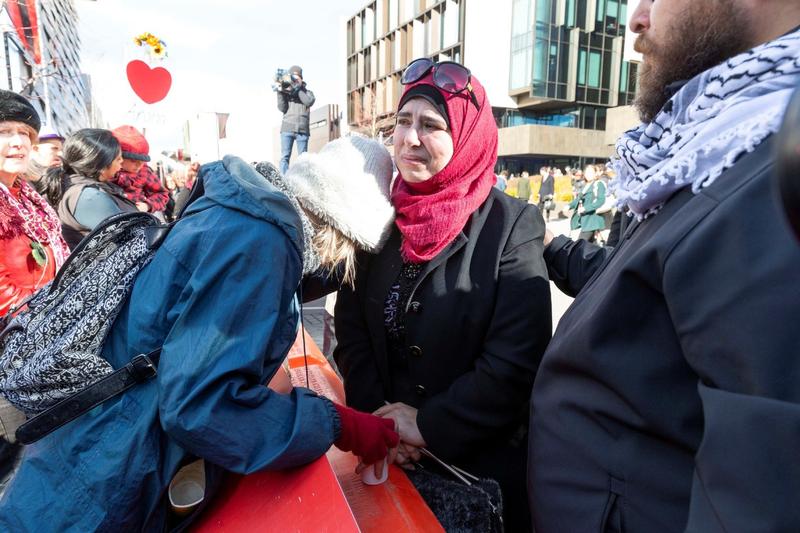 Mosque shooting survivors celebrate with supporters following the sentencing of gunman Brenton Tarrant at the High Court in Christchurch, New Zealand, Aug 27, 2020. (PHOTO / CHINADAILY.COM.CN)
Mosque shooting survivors celebrate with supporters following the sentencing of gunman Brenton Tarrant at the High Court in Christchurch, New Zealand, Aug 27, 2020. (PHOTO / CHINADAILY.COM.CN)
March 15 of 2019 started like any other day in Christchurch, New Zealand. But by the end of the day a quiet, peaceful corner of the world had become the scene of a hate crime that would reverberate around the world.
Brenton Tarrant, a lone gunman murdered 51 men, women and children as they prayed in two mosques. Dozens were left injured and many, many more with mental scars that may never heal.
The 29-year-old Australian gunman was sentenced to life in prison without the possibility of parole, the severest sentence possible, about a year and half later, in the Christchurch High Court last Thursday.
The attack stunned the nation of 5 million people, and in many ways united the country rather than divided it.
"I don't have all of the answers now, but we must collectively find them," New Zealand Prime Minister Jacinda Ardern said at the time. "And we must act." Within 24 hours of the shooting she announced that gun laws would change.
I don't have all of the answers now, but we must collectively find them. Within 24 hours of the shooting she announced that gun laws would change.
Jacinda Ardern, New Zealand Prime Minister
ALSO READ: NZ PM leads Christchurch memorials amid virus scare
She put on a hijab for an emotional meeting with members of the Muslim community.
Within four weeks the gun reforms passed through Parliament almost unanimously, and within two months Ardern launched a global campaign to stop terrorism spreading on social media. The gunman had recorded his killing rampage on a body camera and streamed it live to the internet.
New Zealanders rallied behind the victims.
Sociologist Paul Spoonley, at New Zealand's Massey University, said that before the Christchurch attacks many people would have been unaware of the Muslim community's presence.
The attacks changed all that, but not in the way the gunman may have wanted. Yes, Muslims were terrified, but for the first time they were recognized as Kiwis.
Many new arrivals to New Zealand were escaping war-torn countries such as Syria and Iraq and were looking for a quiet corner of the world where they could raise their families in peace.
Ardern said after the attacks: "Many of those who will have been directly affected by this shooting may be migrants to New Zealand, they may even be refugees here. They have chosen to make New Zealand their home, and it is their home… they are us."
Ashraf Choudhary, who was New Zealand's first Muslim member of Parliament, said: "It made Muslims here feel they were Kiwis, not immigrants."
Choudhary, born in Pakistan, has lived in New Zealand for more than 50 years.
"My perspective might be a little different from many recent arrivals," he said.
Muslims have felt different from mainstream New Zealanders, Choudhary said, noting this is perhaps the case in many countries to which Muslims have migrated.
READ MORE: NZ police warned of another threat before Christchurch massacre
Profound impact
"I have seen many changes here, but the murders in Christchurch have had a profound impact not only on ordinary Kiwis but on Muslims as well.
"The emotional outpouring, from the prime minister down, showed we were all Kiwis. I think that made an enormous difference. Muslims no longer feel as if they are outsiders."
Choudhary said events involving Muslims overseas are reflected in New Zealand, but the country has not experienced the same backlash as elsewhere.
Ardern's empathy with the country's Muslims touched every New Zealander, he said.
"When the prime minister said we are all Kiwis … that changed everything."
According to the Ministry of Social Development, about 77 percent of New Zealand's Muslims are overseas-born, with the largest proportions identifying as Indian (29 percent) and as members of Middle Eastern groups (21 percent) such as Arab, Iranian and Iraqi.


